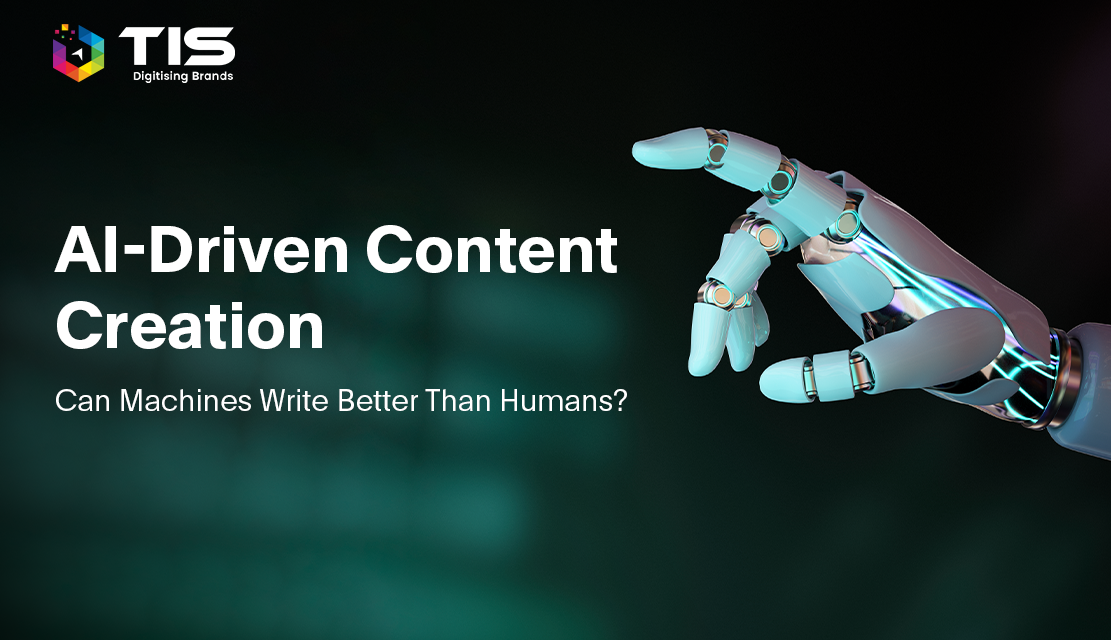
Consider a society in which robots are capable of writing New York best sellers, Oscar-winning film scripts, and post captions that would go viral. You would wonder whether this is something you hear from the movies or comic books – maybe it is!” Well, thanks to the rapid advancements in artificial intelligence (AI), that world is in the making. But these AI-powered content generators are challenging the traditional boundaries of creativity, considering that they can produce more compelling and engaging content. But can AI truly surpass human writing? Will it match the creativity, subtlety, and emotions that humans can provide? This blog has the answer:
Content generation is the backbone of marketing, news sharing, journalism, and the entertainment industry. Earlier, it has been considered as an area that is highly dependent on human factors such as imagination, feelings, and inspiration. Nevertheless, with the help of AI networks, which develop continuously, especially the Natural Language Processing (NLP) and generative models, it became possible for machines to get more involved in creating the text. OpenAI’s GPT-4 and Google’s BERT are some tools that reveal how AI can generate sense-connected content that would emulate human writing.
With the increase of interest in this field, AI is not just a fad that is altering this industry. These models can read vast quantifiable data, perform pattern recognition; and generate text at an astonishing rate. It can draft articles, produce marketing texts and copy, prepare reports, and even differentiate fictional stories.
Another way how AI can benefit content creation is its speed. With a blink of an eye, AI can produce an article that a human writer can’t write. This is especially useful for tasks that deal with a huge amount of text inputs, for instance, when creating product descriptions or for SEO content creation.
The coherency of the language is achieved, making it easier for brands to maintain their unity since the contents produced by the AI are all in harmony. This consistency can be quite a headache to the human writer when he or she is working on a number of projects at a time.
AI can be used to draw conclusions from data and come up with content that will be interesting for the readers. AI, through the use of data analytics, can filter content based on the people; content that is trendy and compelling to the targeted demography.
It is important to note that AI does not require any rest or even sleep like human writers. It can work round the clock, therefore there is continuous production of content since the world is always active and this is helpful to firms with global markets.
But the question remains: the question that may arise is whether these machines can write better than human beings. So let’s get in-depth at human touch content writing:
There are some areas where human writers are still ahead of artificial intelligence despite the fact that the latter possesses numerous outstanding features. Here is how:
While AI can mimic human writing styles, it lacks true creativity and originality. Human writers are able to infuse their work with their feelings, experiences, and points of view, something which cognitive writers can hardly do.
Passed on the ability to comprehend cultural specificities and nonverbal signs which are the major assets of the human writer. AI could put out content that is grammatically and semantically correct but lacks the appeal of work arising from passion such as emotions, irony, and sarcasm, or even the successful incorporation of culture-specific keywords and phrases.
Professional human writers have a better ability to handle certain issues such as plagiarism and issues to do with ownership or copyrights. AI-generated content can sometimes inadvertently reproduce text from existing sources.
The element of appealing to the person, like using stories, humor, and overall perception of one’s emotions is entirely stripped from AI-written material. These elements, if incorporated, can go a long way toward engaging the readers and making them relate to the contents, which is something that the current technologies cannot accomplish fully.
It may be worthwhile to look at the relationship between AI and human writers not in terms of competition but in symbiosis. AI is most effective in basic and data-driven tasks; therefore, human writers will be free to work on other aspects such as the conceptual ones.
For example, writing first drafts, data gathering, analysis, and content generation may be done by AI while tweaking, customer targeting, rapport, and the creation of the all-important voice may well be done by experienced writers. Such an approach, centers on the synergism of both AI and human input, which results in better, faster, and more effective content creation.
AI-generated write-ups have shown tremendous progress and defied conventional writing standards. Content production is greatly enhanced by automated machines which are fast, reliable, and utilize vast amounts of data. Nonetheless, they still lack creativity, emotional intelligence, and personal touch; while this is where humans truly shine in content creation.
AI and human writers working together will create a better future for content writing. This new type of writing that blends AI’s power with human originality can create high-quality materials on any conceivable theme.
If you need assistance but with a human touch, we can provide you with AI + human content at the best price. Connect us to know more.